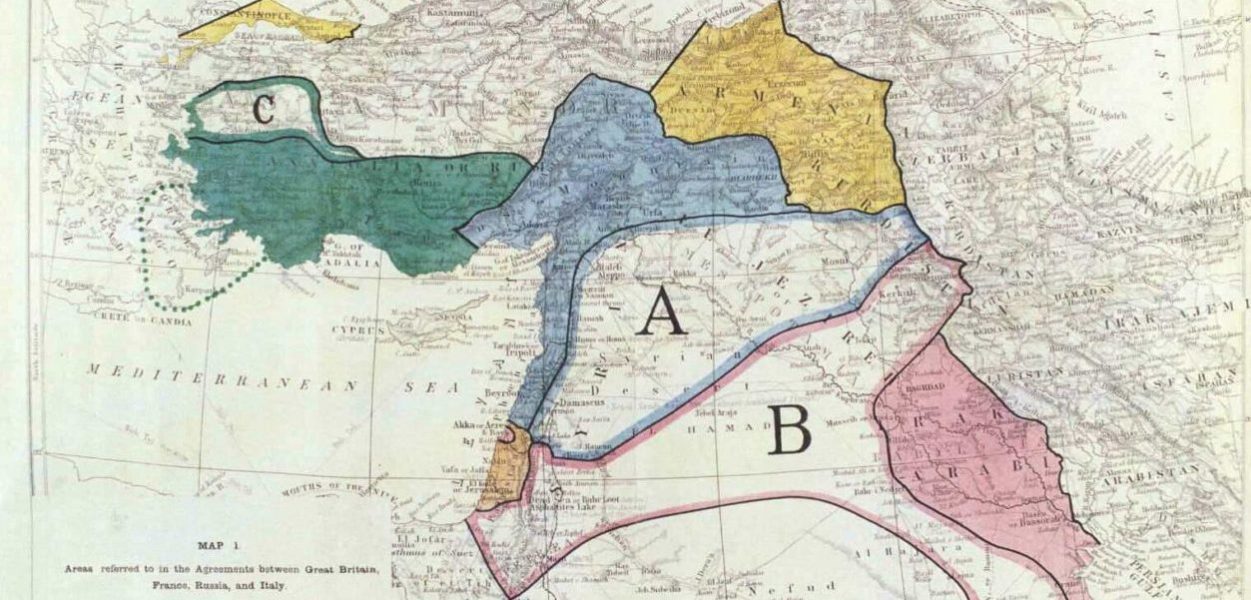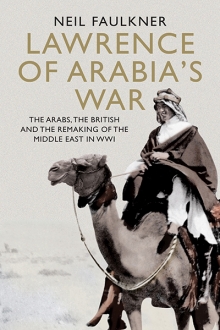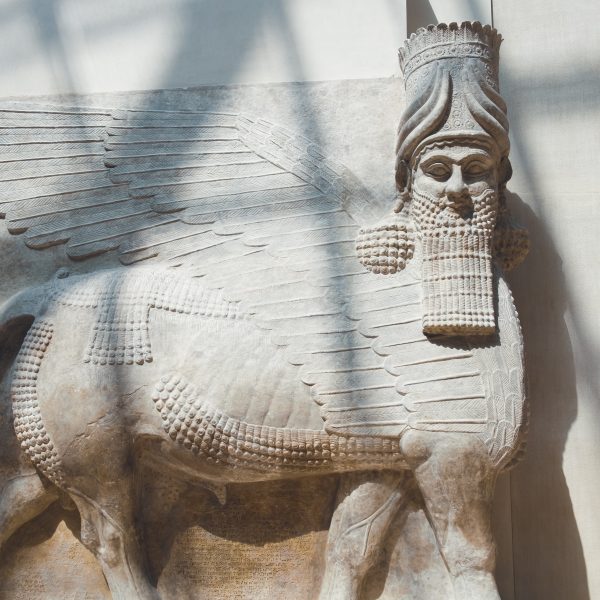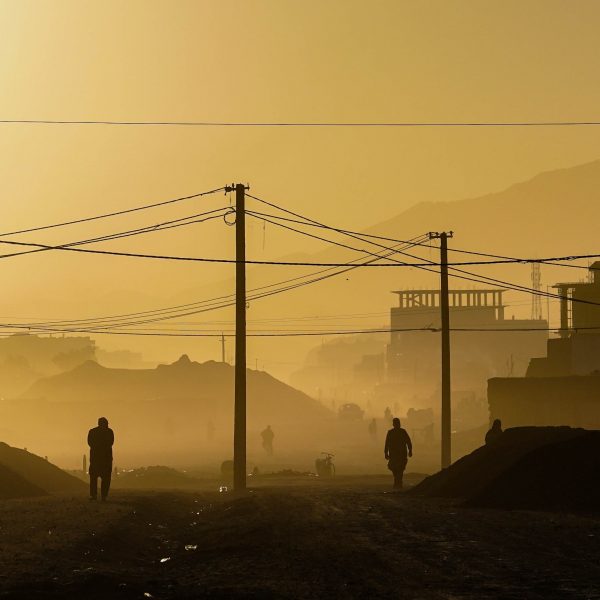The Sykes-Picot Agreement and the Modern Middle East
Neil Faulkner—
A hundred years on from Sykes-Picot, the Middle East is in turmoil. These two things are intimately related.
Mark Sykes was a British diplomat, François Georges-Picot his French opposite number. They gave their names to a secret agreement to carve up the decaying Ottoman Empire between Britain, France, and Russia after the First World War.
The agreement unraveled. The Bolsheviks seized power in Russia, and Commissar of Foreign Affairs Leon Trotsky immediately published all the secret diplomacy he could find in the Tsarist archives. The Russians denounced imperialism and proclaimed world revolution: they would not be helping themselves to any part of someone else’s country. On the other hand, the Italians and the Greeks had turned up at the victors’ banquet and were demanding their share. The former grabbed the Dodecanese Islands. The latter were more ambitious: they launched a full-scale invasion of Anatolia, triggered a Turkish nationalist war of liberation, and were soundly and deservedly driven into the sea.
The British and the French also had problems. The British faced national insurgencies in Egypt in 1919 and Iraq in 1920. Nonetheless, they made the deal stick, grabbing and retaining Palestine, Jordan, and Iraq. The French had to fight their way into Damascus, ejecting Prince Feisal, the leader of the Arab Revolt. They thereby secured Lebanon and Syria. The motives were communications, oil, and profit. The Middle East stood astride the British Empire’s route-way to India, both by sea, and—increasingly important—by air. It also had oil—as we now know, 70% of known global reserves—and the shift of the world’s economies and militaries from coal power to oil power was already under way. French bankers had long-standing commercial relations with the Christian-Maronite bourgeoisie of Lebanon.
It was bad luck for the Arabs. The British had lied to persuade the Hashemite rulers of the Hijaz region of western Arabia to launch a revolt against the Ottoman Empire in 1916. They told them they would back a united, independent, pan-Arab state in the region after the war. At the same time they were negotiating Sykes-Picot with the French and the Russians. The lines in the sand drawn then and, with minor exceptions, still there today are artifacts of Western imperialism. They have nothing to do with geography, ethnicity, religion, or anything contrived by the people of the region themselves.
The mess—for that is what it is—has served the Western powers well ever since. They created a region divided against itself a century ago, a region at war at war with itself ever since—state on state, sect against sect, Sunni versus Shia—and that is just fine for the oil corporates and the security wonks. Crucially, it has kept a good proportion of the oil bottled up in a string of miniature desert kingdoms run by medieval autocrats on the Western payroll.
Iraq can serve as a convenient case-study. When a murderous Western-backed autocrat was overthrown in Iran in 1979, they started funding and arming Iraq’s Saddam Hussein, keeping up the flow through eight years of trench warfare that left a million dead.
When the war ended and the loans stopped flowing, leaving Iraq with crippling debts, Saddam attempted his own local reversal of Sykes-Picot, making a grab for the Kuwaiti oilfields that used to be part of Basra province. The First Gulf War (1990-1) was fought to stop that. Having secured Kuwait’s oil, the British and the Americans then launched the Second Gulf War in 2003 to grab Iraq’s oil. The country was invaded, Saddam’s army was defeated, and the economy was sold off to foreign multinationals. The word for this is imperialism, though it was not the word generally used at the time.
And then it all fell to pieces in their hands. Iraq no longer exists. Instead there are three separate enclaves: a Shia region in the south, where most people look to Iran; a Kurdish region in the north, where people are fighting for a united Kurdistan, which would mean adding other bits from Iran, Syria, and Turkey; and the Sunni region in the west, now conjoined with large areas of eastern Syria under the black flag of Islamic State. This is what the Sykes-Picot carve-up and a century of Western intervention to keep the region fragmented and fractious has brought us to.
While the modern Middle East was being misconstrued in the secret cabals of imperial statesmen a century ago, a young archaeologist turned wartime intelligence officer and de facto guerrilla commander, T E Lawrence, was suffering a slow-motion mental collapse. It was caused by guilt.
He had entered Arabia in the autumn of 1916 full of ambition, enthusiasm, and zest for life; he left Syria in the autumn of 1918 with his mind darkened and destabilized. A romantic dream of a war of liberation in the desert had dissolved into a lived experience of murder, greed, and betrayal that made him “continually and bitterly ashamed”. Convinced that he was leading men into battle—and sometimes to their deaths—on the basis of a colossal deception, he wrote this note for his superior in Cairo in June 1917:
Clayton. I’ve decided to go off alone to Damascus, hoping to get killed on the way. For all sakes, try and clear this show up before it goes further. We are calling them to fight for us on a lie, and I can’t stand it.
In the event, he kept a semblance of sanity a few years more, but he came close to suicide in the early 1920s, and then, a long-term convalescent, he chose the anonymity and security of service in the ranks until shortly before his death in 1935.
Not the least interesting thing about ‘Lawrence of Arabia’ is that he is a metaphor for the highly dysfunctional Middle East designed by Western imperialism in 1916, and repeatedly patched up in the same ramshackle form ever since.
People sometimes ask me what I think ‘we’ should do about ISIS. We? Who are we? Western imperialism is, and always has been, the problem, not the solution, in the Middle East.
Neil Faulkner is a freelance academic archaeologist and historian and editor of Military History Monthly. A research fellow at the University of Bristol, he co-directed the Great Arab Revolt Project in Jordan (2006–14). He lives in Herts, UK.
Further Reading:




























I can unreservedly recommend Neil’s book on Laurence. It’s excellent.